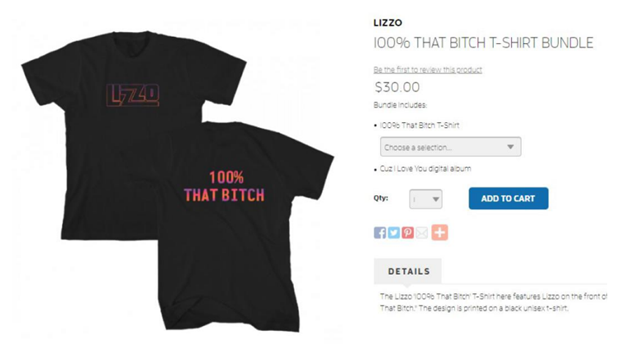Trademark Law Alert -- Lizzo Wins a Trademark Registration as well as a Grammy
Recording artist Lizzo won a 2023 Grammy for About Damn Time as Record of the Year. Four days earlier, her company Lizzo LLC also won an appeal of a refusal to register, for failure to function as a trademark, the song lyric 100% THAT BITCH as her mark for various articles of clothing.

Lizzo LLC had filed several word mark applications at the U.S. Patent and Trademark Office (USPTO) for 100% THAT BITCH for musical entertainment services, audiovisual recordings, and various clothing items. The Examining Attorney approved the applications for the entertainment services and recordings, but refused registration of both of the applications for clothing on the basis that 100% THAT BITCH failed to function as a trademark in connection with clothing goods.
In this unusual case, the Trademark Trial and Appeal Board (TTAB) reversed these refusals, and designated its opinion as precedential.
Background
We have reported prior cases in which a mark was refused registration because it was deemed to be a commonplace expression widely used by a variety of sources to convey an ordinary, familiar, well-recognized sentiment, and therefore failed to function as a mark to identify an applicant’s goods or services and to distinguish them from others.
Failure to function refusals have evolved in recent years. Traditionally, such refusals related to a mark not used in a trademark context on the specimens of record, or a mark consisting of an informational phrase or symbol, such as DRIVE SAFELY.
The USPTO has more recently expanded the scope of failure to function refusals to include just about any phrase or expression which has been used by third parties in a non-source-identifying context, such as TACO TUESDAY for beer and PROUDLY MADE IN THE USA for electric shavers, due to the fact that consumers had already seen such phrases frequently used in the marketplace in non-trademark contexts.
Examination
The phrase 100% THAT BITCH gained popularity after Lizzo used it in a verse in her 2019 hit song “Truth Hurts.” But the Examining Attorney submitted website evidence showing this phrase used ornamentally on the fronts of shirts, mugs, hats, bandanas, sweatpants, lip balm, stickers, and other products offered by third parties, and used in connection with third party entertainment events.
The Examining Attorney described the proposed mark as a “motivational phrase conveying confidence” and cited an Urban Dictionary definition of the mark: “Slang. A woman whom EVERYONE wants to be. Everyone is extremely jealous of her.”
The Examining Attorney’s arguments and evidence all rested on the proposition that 100% THAT BITCH is a commonly-used expression which would not be perceived as a trademark by consumers, and due to its widespread ornamental use by third parties, is incapable of serving as a source-identifier for clothing.
Appeal
Lizzo LLC appealed to the TTAB. Applicant did not dispute the widespread use of 100% THAT BITCH in connection with third party merchandise. Rather, Lizzo LLC argued that the evidence of widespread unauthorized third party use actually established consumer perception associating this mark with Applicant, since others were seeking to “capitalize on Applicant’s tremendous fame and notoriety.” The TTAB accepted this argument, noting that “much of this evidence references Lizzo, her music and song lyrics.”
Lizzo acknowledged that she did not originate the expression, but rather had adopted her lyric from a social media meme containing the phrase “I just took a DNA Test, turns out I’m 100% that bitch.” Although she shared writing credit for the song, the TTAB determined that Lizzo, the individual who famously sang the lyric in the mark, would be viewed as the source for trademark purposes.
The TTAB was also swayed by evidence consisting of the Applicant’s takedown requests and trademark enforcement efforts against unauthorized third party users of the 100% THAT BITCH mark, especially since the retailers who received the requests responded by recognizing Lizzo as the source of the mark.
Further, and notably, the TTAB stated that “ornamental use by others is only one type of evidence that may be relevant to consumer perception … [a]lso pertinent is the nature of the message conveyed….” According to the TTAB, “familiar every day expressions and slogans used to convey social, political, patriotic, religious, and laudatory concepts are more likely to be perceived as imparting information than signifying source” but the “evidence here does not demonstrate that Applicant’s proposed mark is used in general parlance or that it conveys a common social, political, patriotic, religious or other informational message…”
Accordingly, the TTAB reversed the “failure to function” refusal of registration.
In Re Lizzo LLC, Application Nos. 88466264 and 88466281 (T.T.A.B. February 2, 2023)
Takeaways
The TTAB indicated that the nature of a phrase is important in making a failure to function determination, with “general parlance” and “common social, political, patriotic, religious or … informational message[s]” being more appropriate for failure to function refusals.
However, the TTAB’s focus in this case was on Lizzo’s famous association with the applied-for mark. If the mark in question had not been a hit song lyric sung by the well-known Applicant, the TTAB might have accepted the Examining Attorney’s evidence of widespread ornamental use.
Thus, the precedential value of this decision relates to marks that consist of popular expressions which, even if they have been widely used by third parties, still unmistakably point to the Applicant.
For further information, please contact William M. Borchard, John S. Miranda, or your CLL attorney.

Counsel
Email | 212.790.9290
Bill advises on domestic and international trademark matters at the highest level. His practice consists of counseling clients and handling domestic and international trademark and copyright matters including clearance, registration, proper use, licensing, contested administrative proceedings and infringement claims.

Associate
Email | 212.790.9243
John focuses on trademark clearance, counseling, prosecution, and all aspects of trademark registration and portfolio management. He also counsels on copyright matters and IP enforcement.